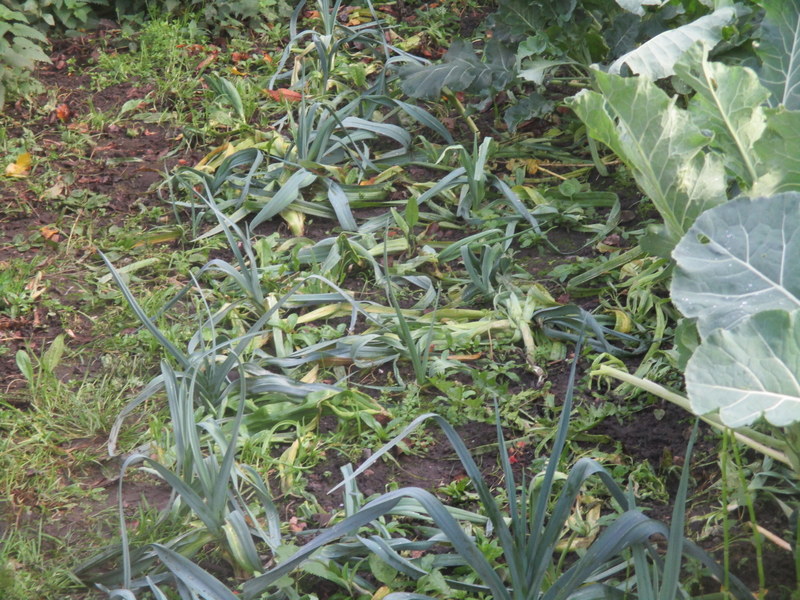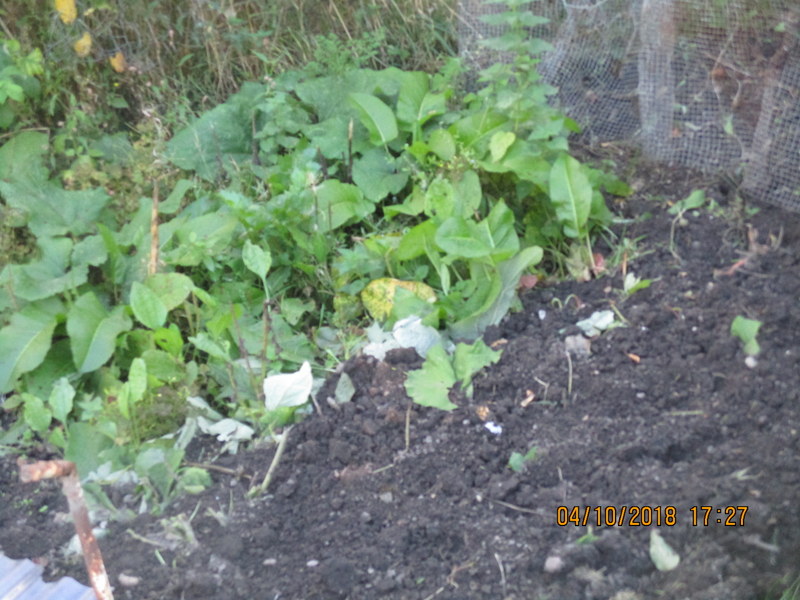'Micro-holding Logs-istics ---- '
October is a surprisingly busy month here on the organic eco micro-holding (small smallholding) in the UK midlands, much of the activity to do with 'maintenance' type work, although some harvesting of beans, soft fruit and 'greens' has been the order of the day. Not, though, of leeks, as the dreaded alium leaf miner fly has struck late and with a vengeance - amazing that a small fly can suck out the 'goodness' and render a fine upstanding plant into a twisted, sunken mis-mash of a mess, then making what was a healthy-looking fine bed of leeks into a disaster area. It's hard to picture a recovery scenario now that most of the growing season has gone, yet that's exactly what happened last year with around 80% of them upstandingly healthy again by Feb/March time, with the help of a couple of nettle juice applications. Needless to say that the current disaster area has had the nettle juice treatment ---- Hey ho, 'perfection's a far-off thing', as they say, although to be fair, touch wood, growing problems and pests don't seem to be too burdensome these days.
.
'Myriad tasking ---- '
The range of October micro-holding activities has been pretty wide, what with hedging and lopping, digging in green manure (self-sown weeds left to grow in the onion patch), clearing leaves onto the compost heap, scything nettles down in the orchard, making good the converandory, wood sawing, removing creepers threatening the roof of the cottage, picking beans, greens, and soft fruit, nettle juicing leeks, planting out autumn onion sets, trimming bean sticks, storing collected floorboards, mending electric wire to 'The Retreat' in the paddock (accidentally cut in two, erm, twice by electric hedging shears), putting up shelf in utility room, cleaning out septic tank sewage run-off channel, putting up doorway and fence to the 'Retreat' area, burning trash - all enough to keep the micro-holder from (mostly) any mischief, apart from a recent boozy mildly rumbustious darts night in the local social club - anyway, least said , soonest mended ---- Following the old countryside dictum of 'doing a bit, leaving a bit', it's still surprising what gets done, and very satisfying it is too, knowing that the 'life support unit' that is the micro holding, is 'surviving and thriving'.
'Wood as fuel --- '
Now that it's time to daily light the woodstove, at somewhere around 4.30 when it's thinking of going dark - either the air-source heat pump or the small halogen heater hold the fort if heat's needed during the day, often fuelled by electric from the solar panels, which seem to do ok in the winter, it's the level of brightness rather than heat which seems to activate them - more 'wood thoughts' occur. Wood as a fuel can for instance take quite a bit of organisation. In the first, a dry wood storage area is preferably needed - the wood's better dry as it both burns better, and then leaves less tar deposits in the system. The bought wood has to be organised and when delivered, put into the woodstore.Then, if as here, not all the wood is as the bought portion, ready cut, then a means of sawing the collected wood is a necessity, generally a sawbench or a chainsaw. More often than not these days probably more likely the chainsaw, which is what the various TV programmes depicting Alaskan wilderness homesteaders also tend to show. Here there's four chainsaws on site, three of them electric, of various ages - often the older ones are kept as reserve or back-up - using the sun's energy courtesy again of the solar panels, and along with the use of 'big D's' big petrol chainsaw when he comes once a year to let loose with it - a lot of wood gets sawn in a couple of hours that day.
'Haul away --- '
This wood has generally been collected from here and there and is for free, apart from big D's wages. This year it was hauled by handtruck from the local farm's spoil pile, only three hundred metres away, where it would have been burnt anyway, plus a good supply of oak floorboards from a similar distance in the opposite direction, this time by motor due to the long lengths involved. Collection generally takes place in summertime so fits in with the general pattern of 'wood activities'. Any wood to be sawn from existing wood piles around the place has then to be hauled by handtruck up to its temporary spot at the front of the main garage, and, once sawn, it has then to be put into store, generally via wheel barrow from the cutting site. Then, of course, throughout late autumn and winter, wood has to be fetched daily from the store into the living room to be put next to the wood stove, which then has to be lit daily, This procedure needs kindling wood and 'small' wood to get the fire going - more 'organisation' involved.
'Two sticks ----- '
Quite a bit of the kindling wood here at the micro-holding comes from old pea sticks which came from topping the sycamore hedge by the compost heaps, which has to be done once a year. Sycamore has the advantage of turning brittle after about six months then to be fit for use as kindling, plus it can be snapped into lengths by hand, making a quick operation. Then the stove has to be 'fed' through the time it's running, and two/three times a week the ash tray emptied, providing invaluable wood ash for the veg growing ground, both supplying potash fertiliser and a mild alkali for keeping the ground 'sweet' (not getting too acid, impairing growth). Soil problems such as onion white rot, brassica root fly and club root have all disappeared over the years here, the feeling being that it's the woodash applications 'what's done it'. So all in all, quite a bit to think about running a wood fuel system and quite a lot of activity associated with it, but perfect to fit in with organic, 'eco friendly' living, and perfect in terms of giving that satisfying 'self-reliant' freerange buzz ----
'Existential satisfactions ---- '
Thoughts then turned to the more specific sources of satisfaction to be had. There's the material itself, tactile and 'workable', there's just something 'natural' about 'working with wood' --- It provides a low-cost form of fuel, and one that's storable on a small scale, as is seen from the farm wood and floorboard wood collected here this summer, in its woodpile under a plastic cover waiting to be used next year, and providing a degree of 'fuel security' (and particularly as no auxillary sources of energy such as electric are needed to operate a wood heating system - particularly here where the woodstove heats the living room and kitchen, and then also, more by luck than judgment, a radiator on the landing which acts as an overflow heat sink, then keeping the landing and two bedrooms warm - ish). It's, as renewable-sourced fuel, taking care of the environment, and the micro-holder too with its associated 'lugging wood about' physical exercise side. The activities involved 'processing' wood to use as a fuel (eg. sawing) can be in the main satisfying and enjoyable, and fit particularly well into the self-reliant mode of lifestyle. Perhaps those involved in the reported recent considerable upsurge in self-sufficient/semi self-sufficient living have been attracted by such benefits, and/or as a reaction to 'press button' living. More power to their elbows --- arms ---legs--- backs-------
'Good connections ----- '
All such activity can't really help but support the good feeling of self-reliance and independence - ? Researching further for the next addition to the 'freerange' site's book page ('Wising Up --- or Dumbing Down - ?' Pt 2 ) revealed interesting concepts which put individuals and individual self-responsibility at a more important level than 'largist', organisation-based culture, with its seemingly implicit mantra of 'big is best', can tend to. The idea was that any 'higher' states involving expanded levels of awareness/consciousness can actually only be accessed at the individual level, one school of thought for instance suggesting that 'life as is generally currently known' is operated at a relatively low consciousness level, then contributing to any 'limitations' of the system --- A society then aiming to run at a more advanced level, would then have to focus on the fuller development of its constituent individuals, to then achieve its aim - a maybe somewhat different 'diametrically opposed' position to many cultures of the 'largist' nature - ? ( TV adverts, for instance, seem often to assume a juvenile level in viewers - ? ).
The argument suggested the following sequence :
Mass >>> Individual >>> 'expanded awareness' beyond small-self ('universal'), personal spirituality, etc
Initially the individual needs the 'safety of the pack', then through life, if not restricted/barrier-ed (eg. by 'mass culture'), then develops sufficient strength to operate as an autonomous individual, able then to progress on to a greater awareness/consciousness position, which could involve a 'personal spirituality' aspect - some suggest, for instance, that real spiritulity can only be experienced at the individual/personal level. Such progression, then harvesting indicated further life positives such as well-being, joy, bliss could maybe be what 'life exploration' and 'freeranging' is about - ?
Practical consciousness ----
Good 'freerangin' type of considerations, and all 'grist to the freerange mill', but right now it's 'down to earth' - literally, the first year strawberry bed which has fruited continously for four months or so, still hasn't got sorted, and is now dangerously weed infested, so it's 'on the knees' remedial action that's urgently needed. Practical physical work is surely a useful means of helping to keep perspective, keep things 'in balance', as it were - ? And then those poor leeks'll need another dose no doubt of the nettle juice elixir - crikey, could get a wee bit over-balanced here - then, oops-a-daisy, down to earth again ----
-



Comments
1 response
1 goodly // Nov 10, 2018 at 12:20 AM
It ?as definitely informative. Your website is useful.
Thank you for sharing!